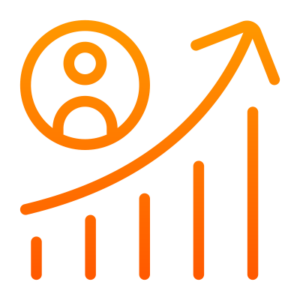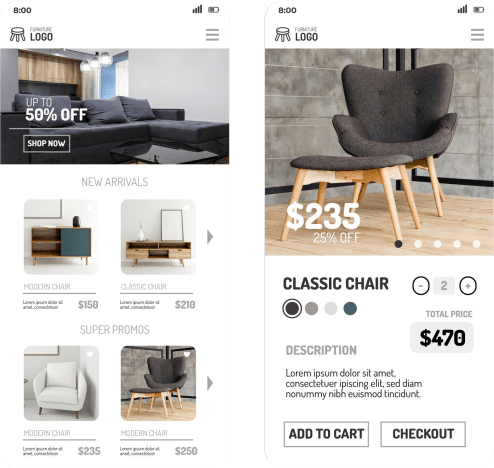User experience (UX) and user interface (UI) design are the cornerstones of creating successful websites and applications.
While often used interchangeably, these two disciplines play distinct yet complementary roles in crafting a seamless and engaging experience for users.

UX Design
The Conductor of the Experience

Imagine a well-rehearsed orchestra. Each instrument plays its part, harmonizing to create a beautiful melody.
UX design takes a similar approach, focusing on the user’s overall experience when interacting with a product.
UX designers act as the conductors, ensuring every element – from information architecture to interaction flow – works together to achieve a clear goal.
Importance and Benefits of UX Design

Increased User Satisfaction
A well-designed user experience keeps users happy and engaged.
By understanding user needs and behaviors, UX designers create intuitive, efficient, and enjoyable products.

Improved Conversion Rates
A smooth user experience translates to a higher likelihood of users completing desired actions, whether it’s making a purchase, signing up for a service, or consuming content.

Enhanced Brand Reputation
Positive user experiences foster brand loyalty and advocacy. When users interact positively with a product, they’re more likely to recommend it to others.
What Does a UX Designer Do?

- Conduct user research to understand user needs, pain points, and behaviors.
- Develop user personas and journey maps to visualize the user experience.
- Design information architecture to ensure content is organized logically and easy to find.
- Create wireframes and prototypes to test and iterate on design ideas.
- Collaborate with UI designers, developers, and other stakeholders throughout the design process.
UI Design
The Visual Maestro

Now, let’s turn our attention to the UI designer, who acts as the visual maestro of the orchestra.
UI design focuses on the look and feel of a product’s interface – the buttons, menus, icons, typography, and visual elements that users interact with directly.
Importance and Benefits of UI Design

Enhanced Usability
A well-designed UI makes a product easy to understand and use.
Clear visuals, intuitive layouts, and consistent design patterns guide users through their tasks effortlessly.

Increased Brand Recognition
A strong UI establishes a product’s visual identity, making it memorable and recognizable to users.

Improved Emotional Connection
A visually appealing UI can evoke positive emotions and create a sense of trust and confidence in the user.
What Does a UI Designer Do?

- Translate UX concepts and wireframes into high-fidelity mockups and prototypes.
- Design visual elements such as buttons, icons, and color palettes.
- Develop style guides to ensure consistency in the product’s visual language.
- Collaborate with UX designers, developers, and other stakeholders throughout the design process.
UI vs. UX Design
The Key Differences

While both UX and UI design are crucial for creating successful products, they address different aspects of the user experience

Focus
UX design focuses on functionality and usability, while UI design focuses on aesthetics and visual communication.

Deliverables
UX designers create wireframes, user flows, and prototypes, while UI designers create mockups, style guides, and visual assets.

Skills
UX designers excel in user research, information architecture, and interaction design. UI designers excel in visual communication, graphic design, and design software proficiency.
5 UI/UX Design Online Courses

1. Google's User Experience Design Professional Certificate
This course offered on Coursera is a great introduction to UX design, especially for those with no prior experience.
Developed by Google experts, the program covers the entire UX design process, from user research and design thinking to prototyping and user testing.
It’s a self-paced program that takes about 6 months to complete and includes hands-on projects to help you build your skills.

2. The Interaction Design Foundation's UX Design Courses
The Interaction Design Foundation (IDF) offers a variety of UX design courses, from beginner to advanced levels.
Their courses are known for their in-depth coverage of UX design theory and best practices.
They offer both free and paid courses, allowing you to find one that fits your budget and learning needs.

3. Springboard's UX Design Bootcamp
If you’re looking for a more intensive UX design learning experience, Springboard’s UX Design Bootcamp is a great option.
This immersive program is designed to help you develop the skills and portfolio you need to land a UX design job in just 12 weeks.
It includes live instruction, mentorship, and career support services.

4. CareerFoundry's UX Design Program
CareerFoundry offers a comprehensive UX design program that combines online learning with live mentorship.
The program is designed to help you develop the skills and portfolio you need to launch a career in UX design, regardless of your background.
They offer flexible learning options, including full-time and part-time schedules.

5. Nielsen Norman Group's UX Certification Courses
The Nielsen Norman Group (NN/g) is a world-renowned UX consultancy.
They offer a variety of UX certification courses that cover a wide range of topics, from usability testing to information architecture.
Their courses are taught by industry experts and provide in-depth coverage of the latest UX design best practices.
These are just a few of the many great UI/UX design courses available online.
With so many options to choose from, you’re sure to find a program that fits your learning style and budget.
UX and UI design are not separate entities, but rather two sides of the same coin.
Working in tandem, they create a harmonious user experience that is both functional and visually appealing.
By understanding the importance and unique contributions of each discipline, businesses can create products with a user-centric approach and maximize their chances of success in today’s competitive digital landscape.
Frequently Asked Questions
There’s no “better” option – UI and UX design are complementary roles.
UI design focuses on the look and feel, while UX design focuses on functionality and user experience.
Both are crucial for creating successful products.
- UX Design (User Experience Design): Focuses on the overall experience a user has when interacting with a product. UX designers research user needs, design information architecture, and create prototypes to ensure a smooth and efficient user journey.
- UI Design (User Interface Design): Focuses on the look and feel of a product’s interface. UI designers create the visual elements users interact with directly, such as buttons, menus, and typography.
Salaries can vary depending on experience, location, and skillset. B
oth UI and UX designers can command competitive salaries.
There’s no single “better” option. Consider your interests:
- UI Design: Ideal if you enjoy visual communication, graphic design, and creating visually appealing interfaces.
- UX Design: Ideal if you’re analytical, user-focused, and enjoy understanding user behavior and designing efficient interactions.
Many professionals have skills in both areas.
While UI/UX design requires understanding design principles and software, it typically doesn’t involve writing complex code.
However, some basic coding knowledge can be beneficial for collaboration with developers.
While AI can automate some tasks, it’s unlikely to replace UI/UX designers entirely.
Human creativity, empathy, and problem-solving skills remain crucial for designing user-centered experiences.
Yes, there’s a growing demand for skilled UI/UX designers across various industries.
Absolutely! Many professionals have skills in both areas.
It allows for a holistic approach to design, considering both functionality and aesthetics.
Order WordPress Website Design
At Maple Web Design, we specialize in creating stunning and functional WordPress websites that captivate audiences and drive results.












